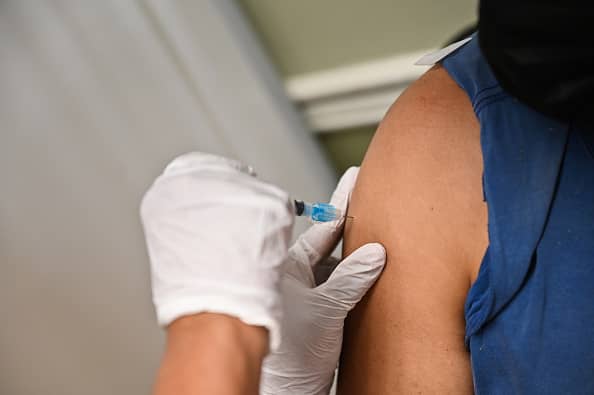There isn’t enough evidence right now to show that booster shots for Covid vaccines are needed, according to a former FDA director.
“Being prepared to make boosters is a good thing, but we really don’t have … evidence, at least in the United States, where we’re seeing vaccine failures or we’re seeing waning in immunity, such that it’s time to deploy a booster,” said Norman Baylor, who was previously with the U.S. Food and Drug Administration’s office of vaccines research and review.
Pharmaceutical firm Pfizer is developing a Covid booster shot, or third dose, to target the highly transmissible delta variant, which has become the dominant strain in many countries including the U.S.
The Centers for Disease Control and Prevention and FDA also said last week in a joint statement that “Americans who have been fully vaccinated won’t need a booster dose at this time.”
Pfizer met with U.S. officials on Monday to make its case for a third shot.
The company worked with German company BioNTech to develop a vaccine that consists of two doses given three weeks apart. It was given emergency use authorization by the World Health Organization in December.
No significant vaccine failure
Pfizer and BioNTech pointed to data from Israel’s health ministry that said there was decreased effectiveness in their vaccine, in terms of preventing infection and symptomatic disease.
The decline in efficacy coincided with the spread of the delta variant and the end of most Covid measures in Israel. The shot remains 93% effective in preventing hospitalizations and serious illness from Covid-19, the ministry reportedly said.
The vaccine failures are really low at this time for the current vaccines that have been deployed. So until that shifts, I don’t think it would be prudent to deploy a booster dose.Norman BaylorBiologics Consulting CEO
But Baylor, who is currently president and chief executive officer of Biologics Consulting, said close monitoring has not revealed “significant vaccine failures” so far.
“We’re just not seeing that now,” he told “Street Signs Asia” on Thursday.
Covid cases are rising in the U.S. again, but doctors say the increase in cases and hospitalizations are due to the delta variant spreading in unvaccinated populations.
“The vaccine failures are really low at this time for the current vaccines that have been deployed. So until that shifts, I don’t think it would be prudent to deploy a booster dose,” Baylor said.
He said health agencies seem to be in agreement that a third dose is not needed.
“We’re just not there yet … we don’t have the evidence that it’s time for a booster,” he said, adding that in future, there could be new variants that render current vaccines ineffective or much less effective.
Vaccine inequality
Richer countries have been able to vaccinate large numbers of their population, while poorer countries lag behind.
The issue of vaccine disparity between regions needs to be addressed, Baylor said.
“A pandemic itself, the definition is that it’s global,” he said, adding that he agrees with the World Health Organization that the crisis needs to be looked at from a global perspective.
Some countries and regions are actually ordering millions of booster doses before other countries have had supplies to vaccinate their health workers and most vulnerable.Tedros Adhanom GhebreyesusDirector-General, World Health Organization
WHO Director-General Tedros Adhanom Ghebreyesus said Monday that the world is “in the midst of a growing two-track pandemic.”
“Some countries and regions are actually ordering millions of booster doses before other countries have had supplies to vaccinate their health workers and most vulnerable,” he said during a press briefing, adding that the world is making “conscious choices” not to protect those who are most in need.
Data suggests the vaccines offer long-lasting immunity against severe and deadly Covid-19, he said.
“The priority now must be to vaccinate those who have received no doses and protection,” the WHO chief said.
Biotech companies like Pfizer-BioNTech and Moderna, which developed another mRNA vaccine for Covid-19, need to “go all out” to channel supplies to places in need, including through the Covax vaccine distribution alliance, he added.
